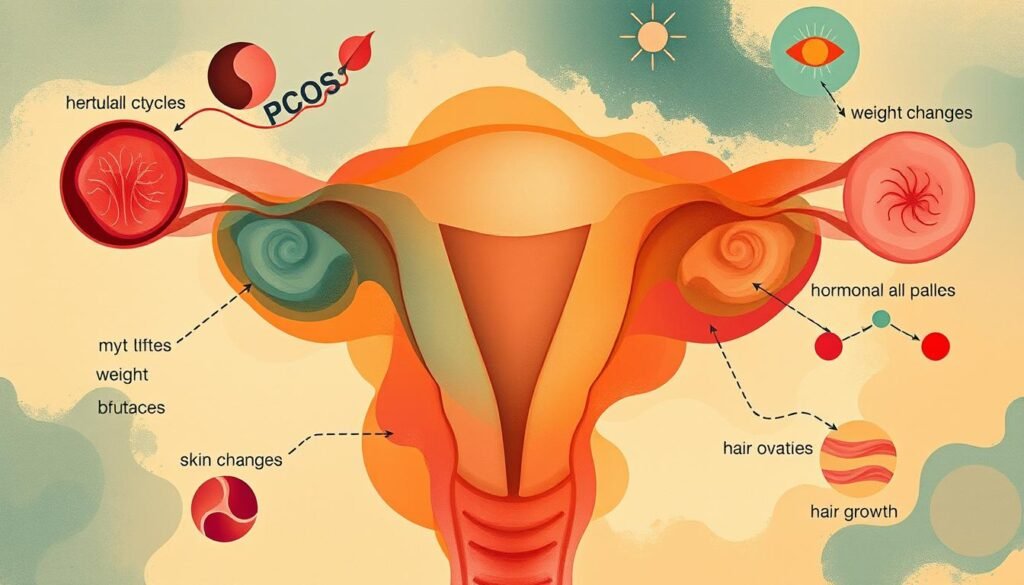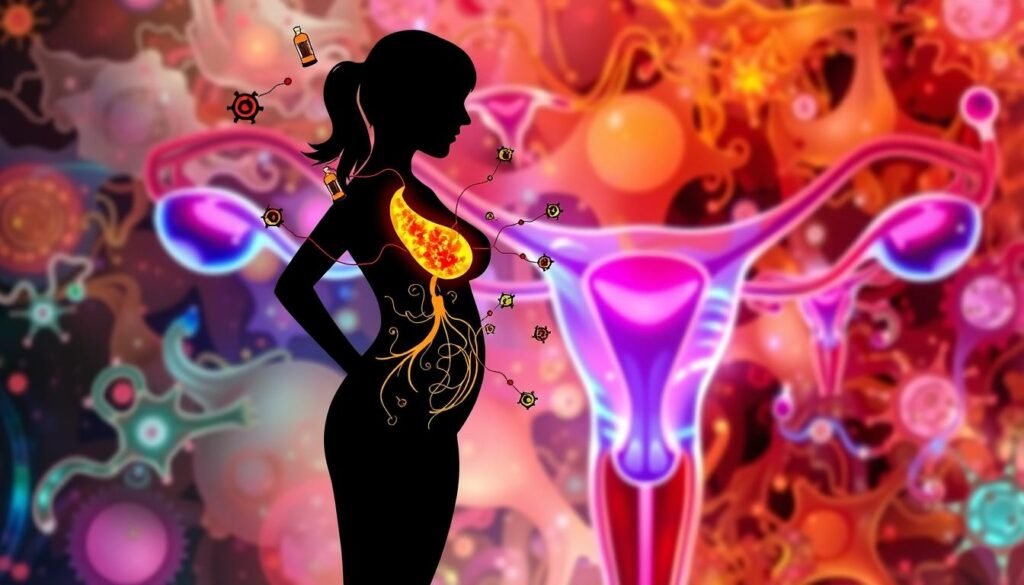About 1 in 10 women of childbearing age in the U.S. have PCOS. This common health issue can make ovulating and getting pregnant hard. Women with PCOS often have hormones out of balance and irregular periods. These issues make having a baby challenging.
Understanding how PCOS affects getting pregnant is key. Those dealing with it must grasp the link between the condition and infertility. This knowlege is crucial for managing reproductive health.
Key Takeaways
- PCOS is a prevalent condition affecting many women in the U.S.
- The disorder can lead to irregular menstrual cycles, complicating ovulation.
- Hormonal imbalances associated with PCOS are significant contributors to infertility.
- Early diagnosis and management can improve fertility outcomes.
- Healthy lifestyle choices can help mitigate some effects of PCOS.
Understanding PCOS: The Basics
Polycystic Ovary Syndrome, or PCOS, is a common endocrine disorder. It affects many women around the world. This condition leads to a hormonal imbalance and can cause ovarian cysts. Although it’s called PCOS, not all affected women have cysts on their ovaries. Sometimes, the disorder isn’t easily recognized.
The true cause of PCOS is still unknown. Experts believe it’s due to genetics, environmental factors, and lifestyle choices. Women with PCOS experience a range of symptoms, making it hard to diagnose. Knowing these factors is essential. They help us understand PCOS’s effects on fertility and reproductive health.
https://www.youtube.com/watch?v=FsNKyKS7M_s
Women with PCOS often have irregular periods, gain weight, suffer from acne, and see more hair growth than usual. The root of these issues is a hormonal imbalance. It interferes with regular ovulation and reproductive wellness. Learning about PCOS is vital. It helps manage symptoms and improves life for those living with it.
| Characteristic | Description |
|---|---|
| Hormonal Imbalance | Elevated levels of androgens and insulin resistance |
| Ovarian Cysts | Fluid-filled sacs on the ovaries; not all women have them |
| Symptoms | Irregular periods, weight gain, acne, hirsutism |
| Prevalence | Affects approximately 1 in 10 women of childbearing age |
What Are the Symptoms of PCOS?
Polycystic Ovary Syndrome (PCOS) comes with different symptoms for each person. Knowing these symptoms is key for the right diagnosis and treatment. Some common signs are:
- Hirsutism (excessive hair growth on the face and body)
- Irregular or absent menstrual periods
- Weight gain
- Acne and skin issues
- Thinning hair on the scalp
Hirsutism causes a lot of stress for women with PCOS. Also, weight gain is a major symptom that makes things worse. Many women face obesity issues which can lead to more health problems. Knowing these signs early helps in managing the condition better.
It’s essential to remember these symptoms can be similar to other conditions. That’s why seeing a healthcare expert is important. They can help tell if it’s PCOS or something else.

How Hormonal Imbalance Is a Key Factor
Hormonal imbalance is crucial in PCOS, affecting ovulation and fertility. It involves key hormones like insulin, estrogen, and progesterone, which impact the menstrual cycle. In PCOS, these hormones may become unbalanced, causing irregular ovulation or anovulation.
This imbalance can stop the body from ovulating regularly. Without ovulation, getting pregnant becomes much harder. Understanding how these hormones interact can help manage PCOS. For women with fertility issues, tackling hormonal imbalances could lead to more consistent ovulation.

Checking hormone levels regularly gives insights into reproductive health. There are many treatments available, from lifestyle changes to medical help to rebalance hormones. By focusing on hormonal health, women with PCOS can aim for better fertility.
The Role of Insulin Resistance in PCOS
Many women with PCOS struggle with insulin resistance. This condition affects how the body handles glucose. It can lead to higher insulin levels. The link between insulin resistance and obesity makes PCOS even more challenging. It creates a cycle that worsens reproductive issues.
Insulin resistance disrupts the balance of key hormones. It affects the production of progesterone and estrogen. These hormones are vital for normal ovulation. Their disruption can cause irregular periods and make pregnancy difficult.
Women with PCOS often deal with fertility problems due to insulin resistance. This includes troubles with ovulating. The connection between metabolic issues and fertility has highlighted the need for effective solutions. Lifestyle changes like diet and exercise can help improve insulin sensitivity. These adaptations are crucial for better reproductive health in PCOS.

Consider the following table to understand insulin resistance’s impact on PCOS. It also shows strategies for improvement:
| Effect of Insulin Resistance | Potential Strategy |
|---|---|
| Impairment of ovulation | Weight loss through diet and exercise |
| Hormonal imbalance | Use of insulin-sensitizing medications |
| Increased risk of obesity | Development of a personalized meal plan |
| Decreased fertility | Engaging in physical activity regularly |
It’s crucial to manage insulin resistance in those with PCOS. They often work on improving their reproductive health through lifestyle and medical steps. For more details on this topic, you can check out the research here. Knowing more about this can help people make better health and fertility choices.
PCOS Affects Ovulation and Fertility
Polycystic ovary syndrome (PCOS) majorly affects women’s ability to have children. It messes with how often they ovulate, creating big problems for those wanting kids. Women with PCOS often have unpredictable periods. This makes it hard to know when they’re ovulating. The hormone imbalances linked to PCOS can stop the ovaries from working right.
Impact on Ovulation Regularity
Ovulation regularity is crucial when looking at how PCOS impacts fertility. Women with this condition may not release eggs regularly, known as anovulation. Not ovulating makes getting pregnant tough since you need to ovulate to conceive. Treating the hormone imbalances of PCOS can help make ovulation more regular, improving chances of getting pregnant.
Relationship with Infertility
PCOS often causes infertility issues. The ovulation problems make it hard for those affected to get pregnant. Catching it early is key for starting the right treatment. Treatment might include drugs to help ovulate, changing lifestyle habits, or fertility treatments. Knowing how PCOS and infertility are connected helps people find the right help, leading them closer to parenthood. For deeper understanding on managing PCOS, check out this resource.
Dealing with PCOS and fertility issues can be easier with the right help. Getting advice from healthcare providers can tailor ways to overcome these challenges. They provide personal strategies to tackle infertility’s early stages.
For more on fertility treatments for women with PCOS, visit this informative site. It talks about medical options and how lifestyle changes can help.
Ovarian Cysts and Their Significance
Ovarian cysts are sacs filled with fluid on the ovaries. They often have no symptoms. In women with PCOS, these cysts are common. They can change hormone levels, affecting ovulation. This can make it hard for those trying to get pregnant, leading to fertility challenges.
There are many kinds of ovarian cysts. Their importance varies. Functional cysts happen during your period and usually go away on their own. They do not usually affect your ability to have children. On the other hand, PCOS-related cysts can upset hormone balance and ovulation. This can bring more fertility problems for affected women.
It’s key to understand ovarian cysts. Women facing fertility challenges because of these cysts should see a doctor. Getting advice from a healthcare professional can help manage symptoms. It also addresses any concerns effectively.
| Type of Cyst | Effects on Ovulation | Impact on Fertility |
|---|---|---|
| Functional Cysts | Usually do not affect ovulation | Generally do not impact fertility |
| Endometriomas | May disrupt ovulation | Can lead to fertility challenges |
| PCOS Cysts | Can prevent regular ovulation | Significantly affect fertility |
| Cystadenomas | Rarely affect ovulation | Minimal impact on fertility |
| Dermoid Cysts | Usually do not affect ovulation | No significant impact on fertility |
Irregular Menstrual Cycles and Fertility Challenges
Women with PCOS often have irregular menstrual cycles. This leads to various fertility challenges. It’s essential to know how these cycles are different from normal ones. This understanding is key to helping those affected. Hormonal imbalances, which greatly affect ovulation, are usually the cause.
Understanding Menstrual Irregularity in PCOS
Irregular cycles are a main symptom of PCOS. They can show as missed periods, unpredictable cycle lengths, or long-lasting menstruation. These issues come from hormonal changes in the body. They disturb the ovulation process. Learning about this helps women understand why tracking their cycles is vital for their reproductive health.
How Irregular Cycles Connect to Fertility
There’s a big link between irregular menstrual cycles and fertility issues. Many women with PCOS face ovulation problems. This reduces their chances of getting pregnant. The timing and quality of ovum release can be irregular. Such inconsistency makes getting pregnant harder, causing stress and worry.
There are educational resources that offer much-needed help. By monitoring menstrual cycles, understanding ovulation, and getting medical advice, women can enhance their chances of conceiving.
| Feature | Regular Cycle | Irregular Cycle |
|---|---|---|
| Average Cycle Length | 28 days | Varies (21-35 days) |
| Ovulation | Occurs regularly | May be absent or unpredictable |
| PMS Symptoms | Consistent symptoms | Fluctuating symptoms |
| Conception Chance | Higher with regular cycles | Lower due to irregular ovulation |
The Impact of Obesity on Fertility in Women with PCOS
For women with polycystic ovary syndrome (PCOS), being overweight makes fertility even harder. Obesity and hormonal imbalances together can make ovulation problems worse. Extra weight messes with important hormonal axes, worsening PCOS symptoms and fertility.
Moreover, heavier women with PCOS face a higher risk of infertility. This is often tied to how they manage their weight.
Weight Management and Its Effects on Hormones
Managing weight well is key to better hormone control and ovulation. Even losing a small bit of weight can improve insulin sensitivity and hormone levels. This boosts fertility for women with PCOS.
Studies show that certain medications can help with weight loss and fertility. Losing weight helps create a better hormone environment for ovulation.
Strategies for Healthy Weight Loss
Women can use several strategies for effective weight management. Eating whole foods and exercising regularly are good steps towards losing weight sustainably. Talking with healthcare experts can offer customized advice and plans.
Making these changes helps with weight and improves overall health in women with PCOS. For more info, check studies such as the ones in scientific literature. By focusing on these strategies, women can better handle PCOS and boost their fertility.